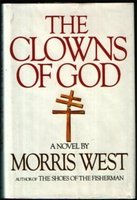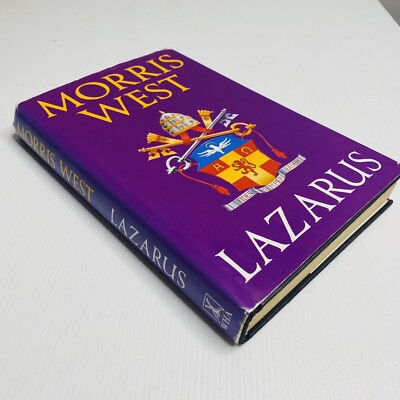The Papal Writings of Morris West: Faith, Power, and Prophecy in Fiction
- Aug 24, 2025
- 5 min read
Morris West is remembered as one of Australia’s most widely read novelists, whose works frequently explored themes of faith, morality, and the tension between spiritual ideals and worldly power. Among his many novels, his so-called “papal writings” – works centered on the Vatican, the papacy, and the spiritual crises of Catholicism in the modern world – stand as his most enduring contributions to literature. To understand these novels, it is essential to begin with the life of the man behind them, for West’s own journey through faith, doubt, and observation deeply informed the characters and conflicts he portrayed.

A Biography
Morris West was born on 26 April 1916 in St Kilda, a suburb of Melbourne, Australia. His early years were shaped by both hardship and religion. Raised in a devout Catholic family, West entered a Christian Brothers seminary as a teenager, initially preparing for a vocation in the priesthood. Though he left before ordination, the years he spent within the cloister gave him an insider’s perspective on the inner life of the Church – its discipline, its devotion, and its secrets.
After leaving the seminary, West worked as a teacher, soldier, radio producer, and journalist before turning to writing full time. During World War II, he served as an intelligence officer in the Australian Army, which sharpened his sense of intrigue and political maneuvering, elements that would later infuse his novels.
West’s breakthrough as an author came in the 1950s, but it was The Devil’s Advocate (1959) that secured his international reputation. From then on, he became a household name, with novels translated into multiple languages and adapted for film and television. By the time of his death in 1999, he had published more than two dozen novels, many of which grappled with moral questions in the context of international politics and the Catholic Church.
Though he never returned to religious life, West remained deeply interested in questions of faith, authority, and conscience. He once described himself as “a man haunted by God,” a phrase that resonates strongly in his papal novels.
His Papal Trilogy
Morris West’s best-known papal writings include:
The Shoes of the Fisherman (1963)
The Clowns of God (1981)
Lazarus (1990)
Together, these three novels form a kind of informal trilogy that examines the papacy in the modern age. They explore the burdens of leadership, the clash between spiritual duty and political necessity, and the enduring tension between tradition and reform.

The Shoes of the Fisherman (1963)
Perhaps West’s most famous work, The Shoes of the Fisherman tells the story of Kiril Pavlovich Lakota, a Ukrainian archbishop who survives years of imprisonment in a Siberian labor camp and is unexpectedly elected pope. Published in 1963, the novel gained immediate attention for its timely relevance: just two years later, the Church would witness the election of Pope John Paul II, the first Slavic pope, who – like Lakota – had lived under communist oppression.
The novel dramatizes the enormous weight of the papacy. Lakota inherits a world in crisis, balancing Vatican diplomacy with Cold War politics. West portrays him not merely as a ruler but as a man burdened with the responsibility of conscience. The novel raises profound questions: How does one reconcile spiritual leadership with political reality? Can a pope speak truth to power in a world dominated by nuclear threats and ideological divides?
West’s vision of a pope from Eastern Europe, long before it became reality, highlights his prescience and his gift for sensing historical currents. The novel was adapted into a 1968 film starring Anthony Quinn, further cementing its place in popular culture.

The Clowns of God (1981)
Nearly two decades later, West returned to the papacy in The Clowns of God. This novel tells the story of Pope Gregory XVII, who shocks the world by claiming to have received a private revelation from Christ concerning the end of the world. The declaration destabilizes both the Vatican hierarchy and the international order. Forced to abdicate, Gregory becomes a wandering figure of faith, grappling with the tension between prophecy and institutional authority.
Here, West explores the conflict between personal conviction and the rigid structures of the Church. Gregory’s “apocalypse” is less about fire and brimstone and more about a confrontation with human arrogance, technological danger, and moral collapse. The novel asks whether religious leaders can afford to speak boldly in an age of skepticism, or whether they must temper their words to maintain credibility.
The book resonated strongly in the early 1980s, when Cold War tensions and nuclear fears loomed large. In portraying a pope who dares to confront humanity with its self-destructive tendencies, West again positioned the papacy not as a relic of history, but as a living voice in global debates.

Lazarus (1990)
The final installment in West’s papal trilogy, Lazarus, takes its title from the biblical figure who was raised from the dead. It tells the story of Leo XIV, an aging pope who suffers a near-fatal heart attack but survives. The experience transforms him profoundly, leading him to embrace reform and renewal within the Church.
Unlike the dramatic geopolitics of The Shoes of the Fisherman or the apocalyptic vision of The Clowns of God, Lazarus is more intimate and introspective. It is a meditation on mortality, change, and the difficulty of leading an ancient institution into a modern age. West portrays a pope who sees, with new clarity, the need to address the Church’s moral failures, including issues of poverty, clerical corruption, and resistance to change.
In many ways, Lazarus reflects West himself in his later years: a man grappling with mortality and legacy, asking what lasting good might come from a life of words and witness.
Themes in West’s Papal Writings
Across these three novels, several themes stand out:
The Burden of Leadership: West portrays the papacy not as a seat of privilege but as a profound burden of conscience. His popes are reluctant leaders, chosen by history rather than ambition.
Faith vs. Politics: The novels explore how spiritual ideals collide with the messy realities of geopolitics, from Cold War tensions to institutional rigidity.
Prophecy and Renewal: West suggests that true leadership often involves confronting uncomfortable truths, whether about the state of the world or the Church itself.
The Human Dimension of the Papacy: Far from presenting popes as distant figures, West reveals them as flawed, suffering, deeply human men who struggle with doubt, illness, and temptation.
Legacy and Influence
Morris West’s papal novels continue to resonate because they bridge the gap between faith and fiction, offering both entertainment and moral reflection. His vision of a global papacy engaged with the crises of the world was ahead of its time. Indeed, his works anticipated real events, such as the election of a non-Italian pope, the role of the Vatican in Cold War diplomacy, and the Church’s ongoing struggles with reform.
For many readers, West’s novels provided an accessible entry point into complex questions about religion, power, and conscience. His ability to blend theological insight with political intrigue ensured that his works reached audiences far beyond the Catholic world.
Finally….
Morris West was more than a novelist; he was a moral commentator who used fiction to grapple with the dilemmas of leadership, belief, and humanity’s place in history. His papal writings – The Shoes of the Fisherman, The Clowns of God, and Lazarus – remain powerful explorations of faith under pressure, relevant not only to Catholics but to anyone interested in the intersection of spirituality and global politics.
Through these novels, West invites readers to imagine the papacy not as a distant institution but as a deeply human drama, where conscience, power, and prophecy meet. In doing so, he left behind a literary legacy that continues to challenge, provoke, and inspire





































